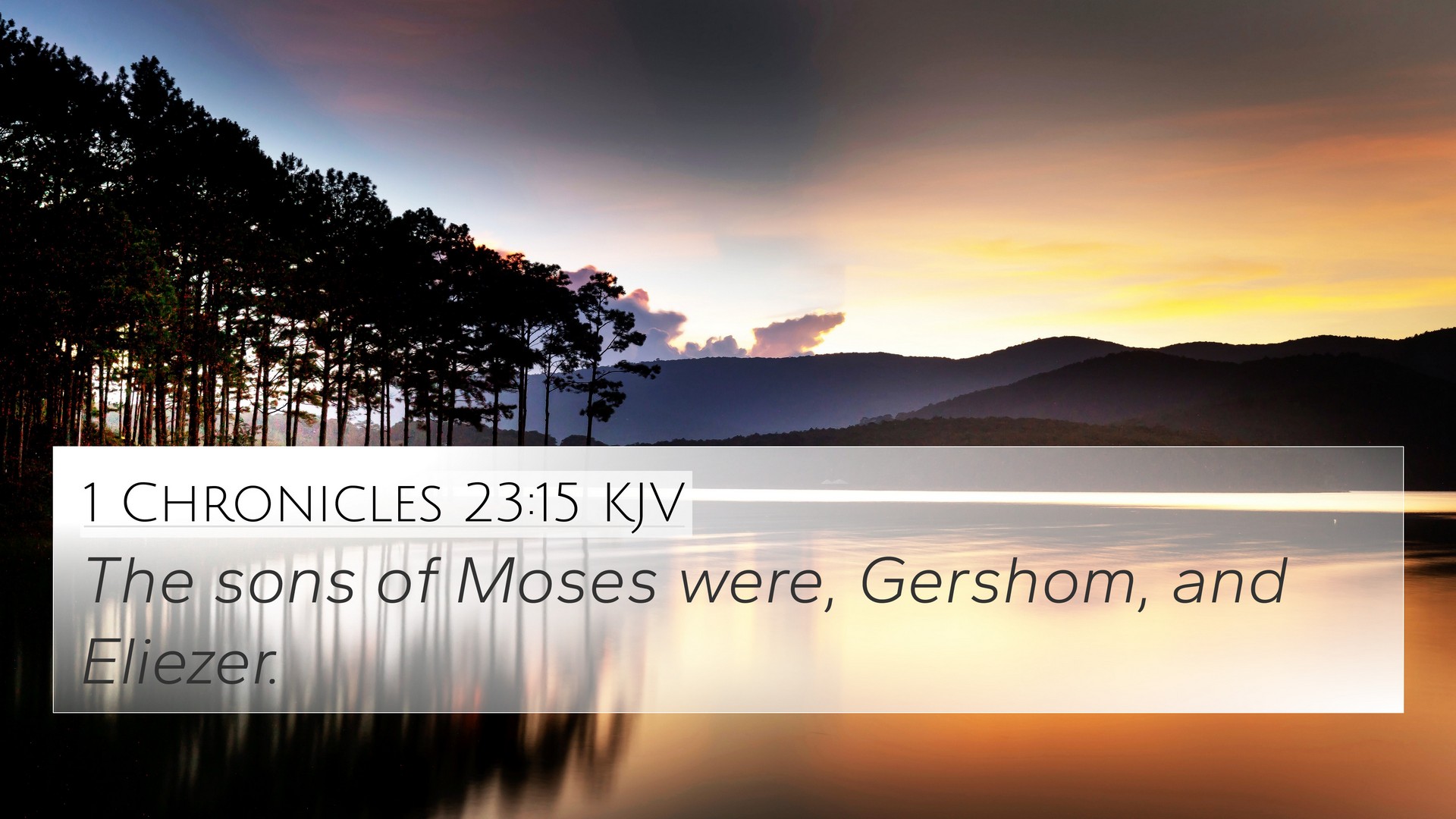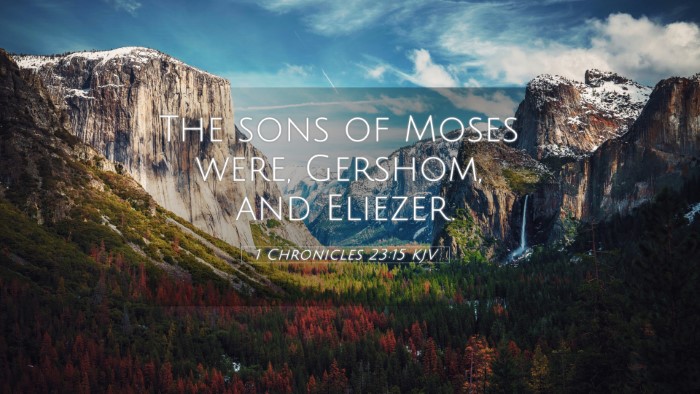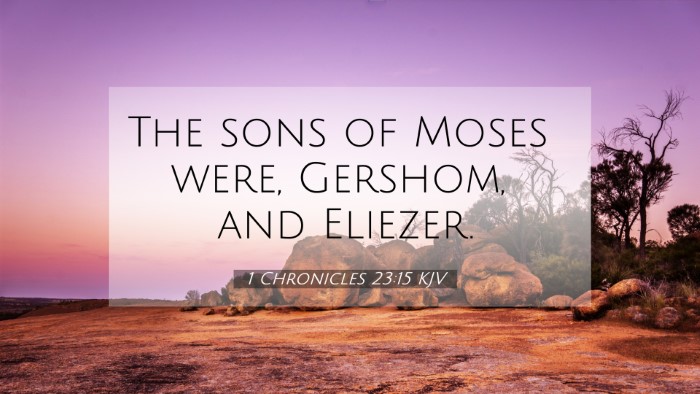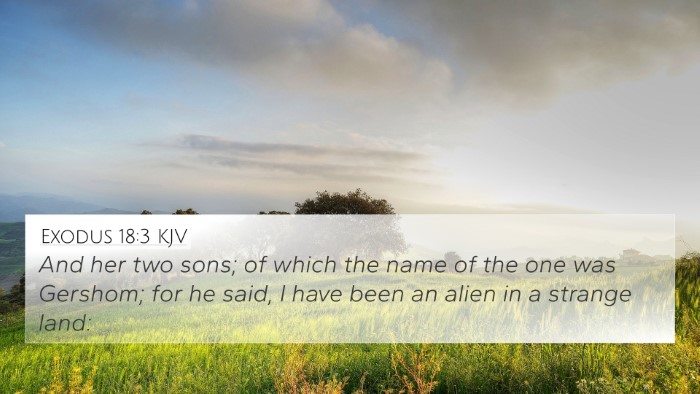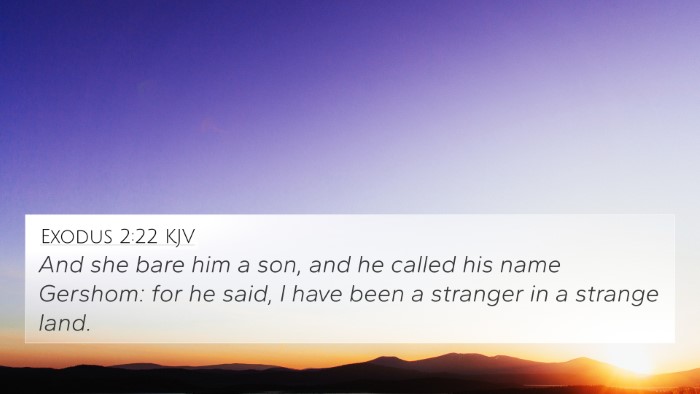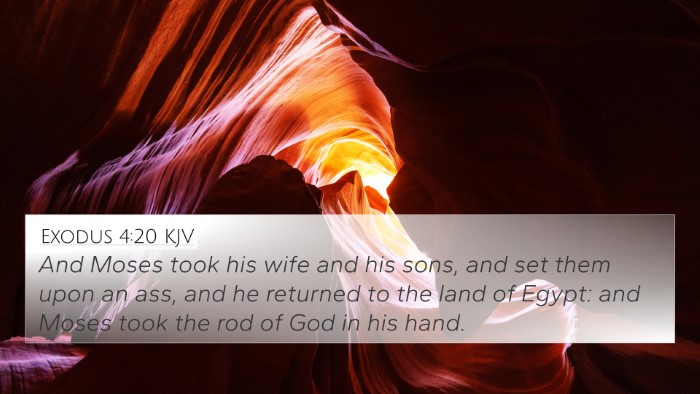Understanding 1 Chronicles 23:15
Verse: 1 Chronicles 23:15 - "The sons of Moses were Gershom and Eliezer." (NIV)
The verse in context emphasizes the lineage of Moses, noting that his sons, Gershom and Eliezer, played a significant role in the priestly lineage. Understanding this lineage is essential for studying the structure of the Levitical priesthood and its implications for worship and service in Israel.
Commentary Insights
Below are summarized insights from various public domain commentaries:
- Matthew Henry: Henry elaborates that the mention of Moses's sons is significant, as it lays the foundation for the priestly order. The genealogy presented not only acknowledges the descendants of Moses but also illustrates God's ongoing covenant through subsequent generations. Moses was a key figure, and his descendants were entrusted with important roles in the service of God.
- Albert Barnes: Barnes highlights the importance of recognizing the roles of Gershom and Eliezer in the larger context of Israel's worship system. He notes how these names connect back to the early stages of Israel's journey, emphasizing the continuity of their religious practices through priestly lineages, which were crucial for maintaining order in the Tabernacle and later the Temple.
- Adam Clarke: Clarke focuses on the historical aspects of the verse, indicating that these descendants of Moses underscore the significance of understanding priestly office and responsibility. He discusses how Gershom’s name means “a foreigner there,” suggesting the mixed heritage of Moses, while Eliezer signifies “God is my helper,” representing divine assistance in the leadership and challenges faced by the Israelites.
Key Themes and Connections
This verse serves as a pivotal link to various themes in the Bible, including:
- Leadership: Moses's legacy continues through his sons, which underscores the importance of godly leadership in both the Old and New Testaments.
- Priesthood: The passage indicates the establishment of priestly lines, pivotal in worship and sacrifices.
- Generational Faithfulness: The role of Moses's sons exemplifies how faith can be carried down through generations.
Cross References
1 Chronicles 23:15 is connected to several other Bible verses, enhancing our understanding of its meaning and implications:
- Exodus 2:22 - "She bore him a son, and he named him Gershom, saying, 'I have become an alien in a foreign land.'" (Explains the background of Gershom, relating to Moses’s experiences.)
- Exodus 18:4 - "For he said, 'My father’s God was my helper, and he rescued me from Pharaoh's sword.'" (Eliezer’s significance as 'God is my helper' is linked to God’s assistance.)
- Numbers 3:4 - "Nadab and Abihu died before the Lord when they made an offering with unauthorized fire before him." (Highlights the importance of priestly lineage, connecting to the significance of Moses's descendants.)
- Hebrews 7:14 - "For it is clear that our Lord descended from Judah, and in regard to that tribe Moses said nothing about priests." (Demonstrates the lineage differences but points to the importance of priesthood.)
- 1 Peter 2:9 - "But you are a chosen people, a royal priesthood, a holy nation, God's special possession..." (Links Old Testament understanding of priesthood to New Testament implications for believers.)
- Malachi 2:4-6 - "And you will know that I have sent you this admonition so that my covenant with Levi may continue," (Related to covenant faithfulness and priestly responsibilities.)
- Luke 1:5-6 - Refers to the lineage of priests in the New Testament, connecting priestly heritage through history and its eternal relevance.
Conclusion
1 Chronicles 23:15 serves not just as a genealogical note but as a crucial element in understanding the continuity of leadership and worship within the nation of Israel. By exploring the connections between Bible verses and employing a cross-referencing Bible study approach, we gain deeper insights into the broader themes of faithfulness, responsibility, and divine assistance.
Tools for Continued Study
For further study, consider utilizing these tools for Bible cross-referencing:
- Bible concordance
- Bible cross-reference guide
- Cross-reference Bible study methods
- Comprehensive Bible cross-reference materials
- Identify connections between Old and New Testament
